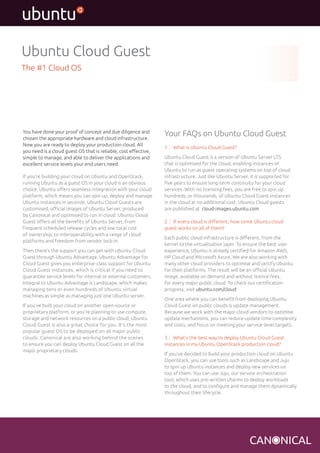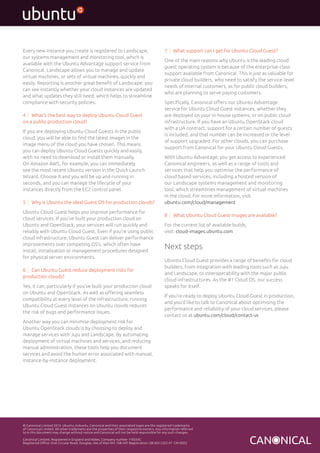Cloud Ubuntu Cloud Guest
- 1. You have done your proof of concept and due diligence and chosen the appropriate hardware and cloud infrastructure. Now you are ready to deploy your production cloud. All you need is a cloud guest OS that is reliable, cost effective, simple to manage, and able to deliver the applications and excellent service levels your end users need. If you¨re building your cloud on Ubuntu and OpenStack, running Ubuntu as a guest OS in your cloud is an obvious choice. Ubuntu offers seamless integration with your cloud platform, which means you can spin up, deploy and manage Ubuntu instances in seconds. Ubuntu Cloud Guests are customised, official images of Ubuntu Server, produced by Canonical and optimised to run in cloud. Ubuntu Cloud Guest offers all the benefits of Ubuntu Server, from frequent scheduled release cycles and low total cost of ownership, to interoperability with a range of cloud platforms and freedom from vendor lock-in. Then there¨s the support you can get with Ubuntu Cloud Guest through Ubuntu Advantage. Ubuntu Advantage for Cloud Guest gives you enterprise-class support for Ubuntu Cloud Guest instances, which is critical if you need to guarantee service levels for internal or external customers. Integral to Ubuntu Advantage is Landscape, which makes managing tens or even hundreds of Ubuntu virtual machines as simple as managing just one Ubuntu server. If you¨ve built your cloud on another open-source or proprietary platform, or you¨re planning to use compute, storage and network resources on a public cloud, Ubuntu Cloud Guest is also a great choice for you. It¨s the most popular guest OS to be deployed on all major public clouds. Canonical are also working behind the scenes to ensure you can deploy Ubuntu Cloud Guest on all the major proprietary clouds. Your FAQs on Ubuntu Cloud Guest 1 What is Ubuntu Cloud Guest? Ubuntu Cloud Guest is a version of Ubuntu Server LTS that is optimised for the cloud, enabling instances of Ubuntu to run as guest operating systems on top of cloud infrastructure. Just like Ubuntu Server, it is supported for five years to ensure long-term continuity for your cloud services. With no licensing fees, you are free to spin up hundreds, or thousands, of Ubuntu Cloud Guest instances in the cloud at no additional cost. Ubuntu Cloud guests are published at cloud-images.ubuntu.com 2 If every cloud is different, how come Ubuntu cloud guest works on all of them? Each public cloud infrastructure is different, from the kernel to the virtualisation layer. To ensure the best user experience, Ubuntu is already certified for Amazon AWS, HP Cloud and Microsoft Azure. We are also working with many other cloud providers to optimise and certify Ubuntu for their platforms. The result will be an official Ubuntu image, available on demand and without licence fees, for every major public cloud. To check our certification progress, visit ubuntu.com/cloud One area where you can benefit from deploying Ubuntu Cloud Guest on public clouds is update management. Because we work with the major cloud vendors to optimise update mechanisms, you can reduce update time complexity and costs, and focus on meeting your service-level targets. 3 What¨s the best way to deploy Ubuntu Cloud Guest instances in my Ubuntu OpenStack production cloud? If you¨ve decided to build your production cloud on Ubuntu OpenStack, you can use tools such as Landscape and Juju to spin up Ubuntu instances and deploy new services on top of them. You can use Juju, our service orchestration tool, which uses pre-written charms to deploy workloads to the cloud, and to configure and manage them dynamically throughout their lifecycle. Ubuntu Cloud Guest The #1 Cloud OS
- 2. Every new instance you create is registered to Landscape, our systems management and monitoring tool, which is available with the Ubuntu Advantage support service from Canonical. Landscape allows you to manage and update virtual machines, or sets of virtual machines, quickly and easily. Reporting is another great benefit of Landscape: you can see instantly whether your cloud instances are updated and what updates they still need, which helps to streamline compliance with security policies. 4 What¨s the best way to deploy Ubuntu Cloud Guest on a public production cloud? If you are deploying Ubuntu Cloud Guests in the public cloud, you will be able to find the latest images in the image menu of the cloud you have chosen. This means you can deploy Ubuntu Cloud Guests quickly and easily, with no need to download or install them manually. On Amazon AWS, for example, you can immediately see the most recent Ubuntu version in the Quick Launch Wizard. Choose it and you will be up and running in seconds, and you can manage the lifecycle of your instances directly from the EC2 control panel. 5 Why is Ubuntu the ideal Guest OS for production clouds? Ubuntu Cloud Guest helps you improve performance for cloud services. If you¨ve built your production cloud on Ubuntu and OpenStack, your services will run quickly and reliably with Ubuntu Cloud Guest. Even if you¨re using public cloud infrastructure, Ubuntu Guest can deliver performance improvements over competing OS¨s, which often have install, initialisation or management procedures designed for physical server environments. 6 Can Ubuntu Guest reduce deployment risks for production clouds? Yes, it can, particularly if you¨ve built your production cloud on Ubuntu and OpenStack. As well as offering seamless compatibility at every level of the infrastructure, running Ubuntu Cloud Guest instances on Ubuntu clouds reduces the risk of bugs and performance issues. Another way you can minimise deployment risk for Ubuntu OpenStack clouds is by choosing to deploy and manage services with Juju and Landscape. By automating deployment of virtual machines and services, and reducing manual administration, these tools help you document services and avoid the human error associated with manual, instance-by-instance deployment. 7 What support can I get for Ubuntu Cloud Guest? One of the main reasons why Ubuntu is the leading cloud guest operating system is because of the enterprise-class support available from Canonical. This is just as valuable for private cloud builders, who need to satisfy the service-level needs of internal customers, as for public cloud builders, who are planning to serve paying customers. Specifically, Canonical offers our Ubuntu Advantage service for Ubuntu Cloud Guest instances, whether they are deployed on your in-house systems, or on public cloud infrastructure. If you have an Ubuntu OpenStack cloud with a UA contract, support for a certain number of guests is included, and that number can be increased or the level of support upgraded. For other clouds, you can purchase support from Canonical for your Ubuntu Cloud Guests. With Ubuntu Advantage, you get access to experienced Canonical engineers, as well as a range of tools and services that help you optimise the performance of cloud based services, including a hosted version of our Landscape systems management and monitoring tool, which streamlines management of virtual machines in the cloud. For more information, visit ubuntu.com/cloud/management 8 What Ubuntu Cloud Guest images are available? For the current list of available builds, visit: cloud-images.ubuntu.com Next steps Ubuntu Cloud Guest provides a range of benefits for cloud builders, from integration with leading tools such as Juju and Landscape, to interoperability with the major public cloud infrastructures. As the #1 Cloud OS, our success speaks for itself. If you¨re ready to deploy Ubuntu Cloud Guest in production, and you¨d like to talk to Canonical about optimising the performance and reliability of your cloud services, please contact us at ubuntu.com/cloud/contact-us ? Canonical Limited 2013. Ubuntu, Kubuntu, Canonical and their associated logos are the registered trademarks of Canonical Limited. All other trademarks are the properties of their respective owners. Any information referred to in this document may change without notice and Canonical will not be held responsible for any such changes. Canonical Limited, Registered in England and Wales, Company number 110334C Registered Office: One Circular Road, Douglas, Isle of Man IM1 1SB VAT Registration: GB 003 2322 47 CM-0022


